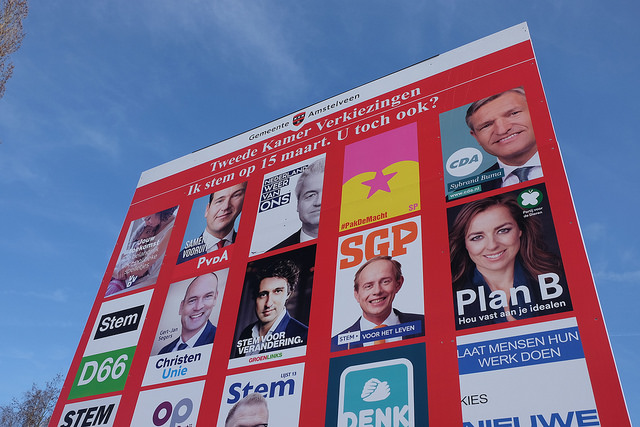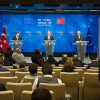
Critical elections for the European Union
As many scholars and analysts have underlined in countless articles, the year 2017 will be one of the toughest for the EU given the number of critical elections to be held. Three of the Union’s six founder-members are going to the ballot box, with the Dutch being first in line. The elections in the Netherlands have received much international attention on account of the populist leader of the Party for Freedom (Partij voor de Vrijheid, PVV), Geert Wilders, who has caused considerable concern and is viewed as a further piece in the domino effect that may well upturn European integration. Although it was ahead in the polls for some time, in recent weeks the PVV’s support had begun to decline. Then something very unexpected occurred: the country found itself embroiled in a diplomatic crisis with Turkey, a country that is also set for the most critical constitutional referendum of its history. Since in Turkish politics the nationalism card always plays well, the dispute with the Netherlands provided an excellent opportunity to convince the undecided nationalist vote. Despite the diplomatic crisis having loomed over the Dutch elections, finally the People’s Party for Freedom and Democracy (Volkspartij voor Vrijheid en Democratie, VVD), of Prime Minister Mark Rutte, received the biggest share if the vote. His firm attitude while handling the crisis was perhaps the reason why he had no last-minute loss of votes.
In a nutshell, what happened with Turkey?
Turkey’s governing Justice and Development Party (AKP) wanted to campaign in the Netherlands for a ‘Yes’ vote in the upcoming constitutional referendum, since there are thousands of dual-citizenship Turkish-Dutch citizens. However, the Dutch government decided not to allow Turkish Ministers to speak at rallies ahead of the country’s own elections. While the Foreign Minister’s plane was denied permission to land, another Turkish Minister, Betül Sayan Kaya, who is responsible for Family and Social Policies, decided to drive to the Netherlands and test the limits. When he was prevented by the Dutch police from entering the Turkish Consulate, members of the country’s Turkish diaspora began to demonstrate in its vicinity, and then things got ugly. The Minister was deported to Germany while the police intervened to disperse the crowd. The events were widely publicised on Turkish television and heavily criticised by both the government and opposition. Subsequently, the government opted for diplomatic sanctions, among them not allowing the Dutch Ambassador to return to his post in Ankara, refusing to grant Dutch diplomatic missions permission to cross Turkish airspace, temporarily cancelling the Turkey-Netherlands joint parliamentary committee and halting all high-level dialogue with the Dutch. The stance was fully supported by the main opposition party.
Since there have been similar disputes with Germany, Austria, Belgium and Denmark over organising rallies, the Turkish government has been exploiting the situation to stir up anti-European feeling among the public. It is also very important to remember that according to Turkish electoral law it is forbidden to campaign abroad. Since the race is neck-to-neck with no clear result in sight, further crises, both domestic and international, should be expected
Has the dispute with Turkey affected the Dutch election results?
The Dutch Prime Minister Mark Rutte’s firm attitude over the dispute with Turkey has been perceived as having trumped Geert Wilders, since the latter had appropriated the country’s anti-immigration and anti-Islam discourse. Another plausible claim is that the crisis escalated because of Wilders having reshaped the country’s political cleavages, pushing all political parties to more extreme positions. It is also important to bear in mind that on the weekend immediately before the elections most voters were still undecided, thus making it possible for any issue to sway public opinion.
On this occasion, considering the profusion of political parties in the Dutch Parliament as a result of having one of the world’s most fully proportional electoral systems, the status-quo has defeated populism. Yesterday’s election thus had many winners and many losers, and the winners will seek to form a coalition to govern the country. There were 28 political parties competing for 150 seats in Parliament. According to preliminary results, turnout was 82%, which is very high compared with both other European democracies and the previous 2012 elections. The Prime Minister, Mark Rutte, appears to have gained the most votes despite his party losing quite a number of seats. He now needs to cobble together a multi-party coalition. The major loser of the elections has been the Labour Party (Partij van de Arbeid, PvdA), which relinquished almost 30 seats according to preliminary results.
What to expect next?
This has been a significant example of domestic politics leading to an external crisis. Considering the extreme polarisation of Turkish society and the referendum’s importance, the likelihood is that there will be many more disputes to come, either domestic or foreign. The irony is that the Turkish government has blamed the Netherlands for being undemocratic and not allowing its politicians to campaign freely, in breach of the freedom of assembly and speech. Given the current situation in the Turkey regarding journalists, academics and opposition leaders, such criticism should be taken with a large pinch of salt.


